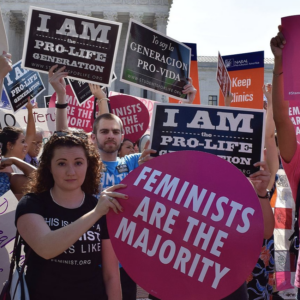Friday morning began with two oddly parallel numbers.
At 9:45 am, the University of New Hampshire Survey Center released a stunning new poll that found 66 percent of Granite Staters disapprove of President Joe Biden’s handling of the economy.
Some 30 minutes later, the U.S. Supreme Court pushed that poll off the front page with its 6-3 decision upholding Mississippi’s 15-week abortion restriction. And it unleashed a political whirlwind with its 5-4 decision overturning Roe v. Wade.
The question for Granite State politics is this: Which number — the president’s performance on the economy or the Supreme Court’s 5-4 vote on Roe — will be more important to voters in November?
Today, the passion and political energy behind the pro-choice movement are at a thunderous peak. If the midterms were held today, Democrats would almost certainly outperform their moribund polling.
But the election isn’t today. The primaries are still nearly three months away. Many things will happen between now and Election Day, including the realization that the Supreme Court’s decision has had no impact whatsoever on New Hampshire.
The Democrats’ strategy for handling the court striking down Roe has been obvious since Justice Samuel Alito’s draft opinion was leaked two months ago. They are ignoring voters who actually understand the legal debate, the proper role of the court, etc. Instead, they are focusing their message on voters who don’t follow politics all that closely and who are likely to believe the Democrats’ most extreme claims: Gov. Chris Sununu has “banned” abortion in New Hampshire (he hasn’t); the Supreme Court just banned abortion in America (it didn’t).
Counting on less-than-informed voters to cast ballots based on less-than-accurate information is hardly a novel concept in American politics. (Some would argue it is the essence of American politics.) And Democrats are right that a vote cast by someone who thinks Justice Clarence Thomas wants to confiscate your condoms counts just as much as everyone else’s.
And so it is possible that members of the voting coalition that helped re-elect President Barack Obama in 2012 — single women, younger voters. and people of color — could be energized by those messages.
The obstacle to that strategy isn’t Donald Trump. It’s Father Time.
First is the aforementioned voter education. What will Granite State Democrats tell these voters when, after three months of marches and protests and overhyped “Handmaid’s Tale” rhetoric, Planned Parenthood NH is still doing business as usual? When, even as states like Louisiana and Oklahoma are drastically restricting abortion, places like Massachusetts and New Jersey are passing laws guaranteeing abortion without restrictions and using tax dollars to fly women in from out of state to undergo the procedure?
In that environment, will voters who aren’t already motivated by the abortion issue stay outraged and engaged?
Second, in addition to abortion, here are some other things the Supreme Court did not ban: Inflation. $5 a gallon gasoline. Mortgage rates hitting double digits. Recession.
Like legal abortion, they are not going away, either.
And what about Granite State Republicans? What should their strategy be?
The smart ones will keep their heads down and their mouths shut, at least in the short term. For many women, this issue is beyond politics. It is extremely personal. Having a college-dorm debate about the limits of stare decisis or the biology of trimesters right now is a big mistake. Wading into social media to celebrate the decision this week would be political malpractice.
That does not mean Republicans should hide from the issue. Whether they are pro-choice like Gov. Chris Sununu or pro-life like most of the candidates running for Congress and U.S. Senate in New Hampshire, they should have their answers ready and stand by their positions when asked.
And they will be asked — starting with NHJournal’s GOP U.S. Senate candidates’ debate this Monday night.
Sen. Maggie Hassan, on the other hand, who has pledged to fight to end all restrictions on abortion in New Hampshire — including in the last weeks of pregnancy, or for the purpose of sex selection — will not be asked by reporters about her politically-extreme stance. That extremism won’t hurt her this week, or next. In fact, it may never actually cost her any votes in pro-choice New Hampshire.
But by November, her extremism will make it harder for her to push abortion as an issue. The fact is, most Granite Staters support the law we have today, regardless of what the Supreme Court says. Hassan’s position when she faces her Republican opponent will be that she wants to end a popular position and replace it with an extreme, less popular one.
Make no mistake: The Supreme Court decision will be a net benefit to Democrats, if only by giving them something — anything — to talk about other than the Biden presidency. And few organizations are as good at fundraising as the pro-choice groups. There will be mountains of money pouring in over the next month and Republicans need to find a way to compete.
But the odds that New Hampshire politics will be frozen in time, in this moment of churning anger and passion, until November are very low. Between now and November there will be five more monthly reports on the inflation rate. There will be (at least) one more Fed rate hike in interest rates. Moms and dads will make dozens of trips to the grocery store, and thousands of calculations about how to stretch their budgets to cover the higher costs.
The Southern border will still be in chaos. Parents will still be looking for ways to make up the classroom instruction lost due to wrong-headed COVID restrictions and the vagaries of Zoom schools.
And Joe Biden will be just days away from turning 80. And that is a number there is no way for Democrats to get around.




